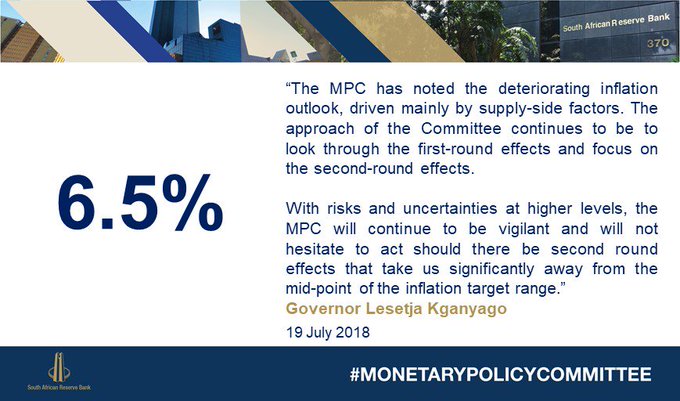Lesetja Kganyago, the Sarb governor told media today at a press briefing that the
Earlier today, Business Report reported that economists said that the slight increase in inflation was unlikely to sway Sarb’s hand into undue hawkishness when its Monetary Policy Committee (MPC) delivered its interest rates decision this afternoon.
Investec’s Lara Hodes said that the market expected no change in the repo rate as the outlook remained relatively flat in the immediate term. Hodes said that the MPC would be more concerned with oil prices and the rand’s exchange rate against the dollar.
“We estimate that the longterm structural inflation rate in South Africa is around 5.5 percent year on year and continue to forecast a 25basis point (bp) hike in the repo rate in January 2019, with another in March 2019 and a further 25bp lift in 2020 in order to return South Africa’s interest rates to neutral levels,” Hodes said.
All 25 economists surveyed by Reuters had predicted the repo rate would stay on hold.
“While headline inflation is comfortably within the inflation target band, indications are that we have passed the low point of the current cycle,” Governor Lesetja Kganyago told a news conference, citing the tariff war between the United States and China as well as higher global oil prices as the main dangers to inflation.
On Wednesday data showed headline consumer inflation quickened to 4.6 percent year-on-year in June, further away from March’s 7-year low but well within the central bank’s target of between 3 and 6 percent.
All 25 economists surveyed by Reuters had predicted the repo rate would stay on hold.
The bank said the weakening currency as global financial conditions tightened, as the Federal Reserve raised lending rates and lowered it’s global bond buying program.
The bank also cut its growth forecast for 2018 to 1.2 percent from 1.7 percent, saying conditions were challenging and would be constrained in the near term by weak consumer spending linked to the recent increase to value added tax and unemployment which is near record levels.
“The domestic economic growth outlook for this year is weaker than we expected in May, Kganyago said.
The continent’s most industrialised economy suffered its worst quarterly contraction in nine years in the first quarter, and consequent data has been mixed, cooling investors enthusiasm over President Cyril Ramaphosa’s ability to deliver long term growth.




-featured.jpg)


